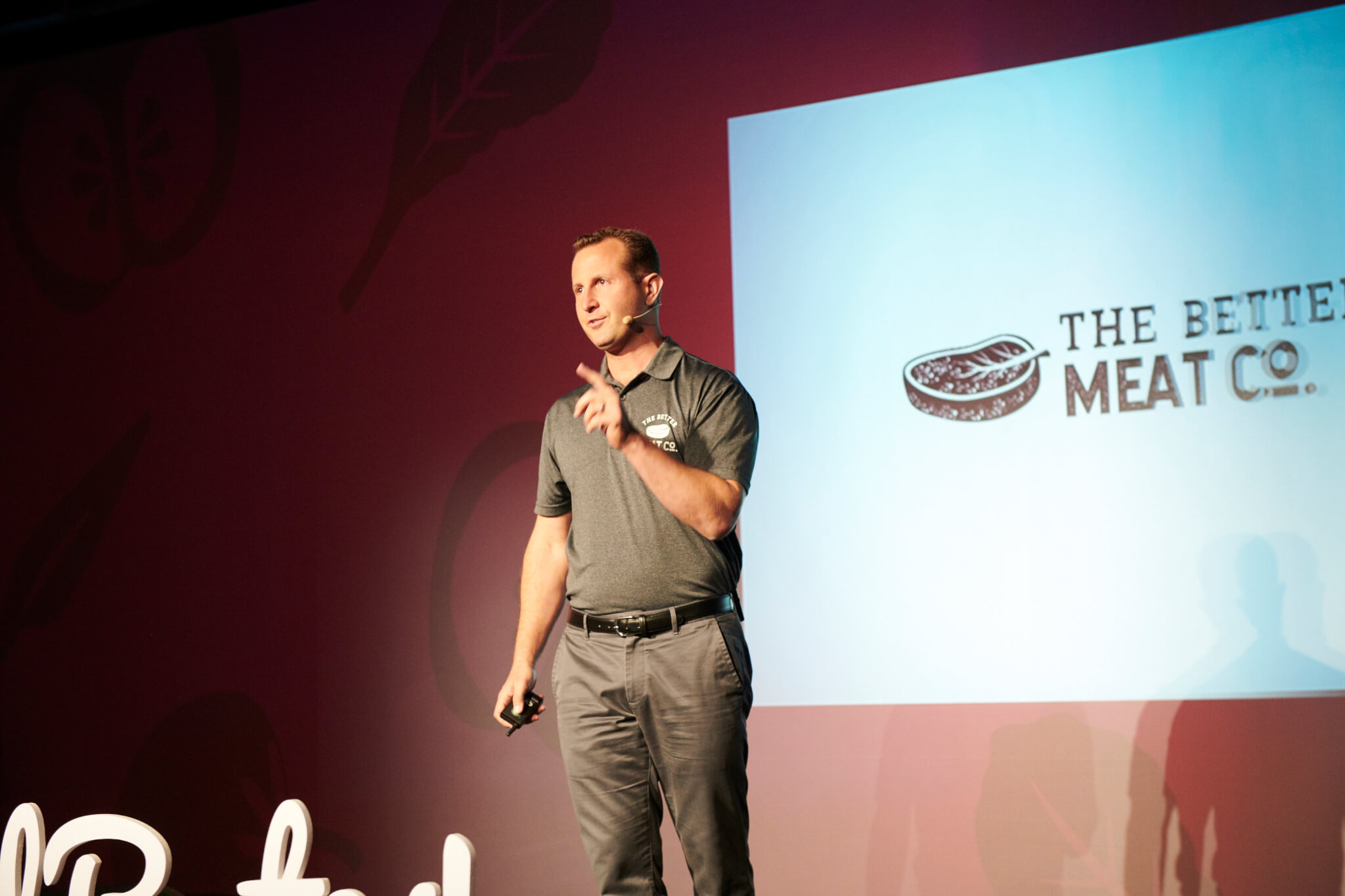FoodBytes! Chicago stormed the windy city with a variety of innovations including everything from printed sensors to fight food waste to a closed-loop system for local salmon. The plant-based trend made a strong showing at the event, as well, with a number of the applicants focused on plant-based foods, according to one of the judges, Darren Streiler of ADM Ventures.
The Better Meat Co., one of the plant-based pitch companies, offers food manufactures vegetable-based blends that can be added to meat products to create hybrid offerings. It closed its first pre-seed round nine months ago to the tune of $1.6 million and was in the process of closing its second round during the FoodBytes! Chicago pitch event, according to the Sacramento-based startup.
Paul Shapiro, CEO and co-founder of The Better Meat Co. is the author of “Clean Meat: How Growing Meat Without Animals Will Revolutionize Dinner and the World.” He spoke to AFN on the sidelines of FoodBytes! Chicago to tell us more about his startup.
How did you come up with the concept of hybrid meat?
The concept really was something that I had been talking about with a friend of mine for a number of years. I always thought someone ought to do this, that it’s an effective strategy, a good business, and a way to improve food sustainability. People I talked to didn’t do it so I thought why not me?
The basic premise is that plant-based meat still represents less than 1% of meat sold. Even in dairy plant-based milk is 13%. That means nine out of 10 cartons of milk being sold still come from cows. And 99% of meat that is being sold comes from animals too, so I think there’s a good number of people willing to switch from animal to plant protein some of the time. But I think there are people who would be happy to eat plants in their actual meat.
Why do you think it’s necessary as opposed to pure plant-based?
I love purely plant-based companies. I am rooting for them and eat their products – I hope they succeed. At the same time, we have to realize that almost all meat that is sold comes from animals. The number of people who will switch to plant-based meat is certainly growing. I think that’s fantastic, but most people are still just eating meat and that will continue for a long time.
In fact, meat consumption is going up, not down, both here in the US and especially in places where it matters the most, like China, India and Brazil. That’s where you have the greatest populations, big population growth and increase in per capita demand for meat.
What types of plant proteins do you offer in your formulas?
We offer a variety of different custom formulations, depending on the needs of our customers. Many are based on a wheat protein, which works in a lot of products, especially breaded products that have wheat in them already. If people want wheat-free proteins, we do offer a soy-based version and totally allergen-free versions as well.
What’s been the biggest challenge you’ve faced so far?
With any small startup, we always have challenges that we have to overcome every day. It could be staffing questions or developing allergen-free lines that are actually affordable for our customers. But I think the scaling we are doing now with Perdue has been a challenge and one we have been able to manage and manage well. The products that Perdue are now selling with our ingredients are called Perdue Chicken Plus, which is a 50/50 blend of meat and plant-based protein. It’s being sold in 7,100 supermarkets across the US, including in Walmart. I am proud of a team as small and young as ours that we can supply Perdue with this volume.
Do you see supply being an issue for you?
It’s a concern with some ingredients but not others. We are really adamant about not only being an affordable source of plant protein, but also a scalable source for our customers. That’s because, yes, we have some smaller customers but we have customers like Perdue and we want more of these big customers. For niche ingredients that are expensive and limited in supply, they won’t work for us.
Why are you not creating The Better Meat Brand? Why ingredients?
We basically make tech that we can offer to the major meat users for them to do better, use less meat and more plants while improving taste and sustainability. We could create a brand and convince consumers to switch to our products but I think we will have a bigger impact by helping big food players make their products better.
What lessons have you learned from the hype in the alternative protein space?
We have to be able to sort fact from fiction. The reality for us is that the numbers speak volumes. We are already selling a good amount of product. This isn’t theoretical for us and it’s doing quite well. I do think that there is some hype that is out there for certain technologies that may not be commercialized for years to come or that have not proven to be viable at the same time. There are some success stories out there, too. Products from Impossible Foods and Beyond Meat are showing that these products can scale and that mainstream consumers will be happy to eat them.
What has the FoodBytes! experience been like for you?
The FoodBytes! experience has been quite positive. I’ve learned a lot from the mentors and the other entrepreneurs by talking about the challenges they face and the solutions they are finding.
The next FoodBytes! event is taking place in London on November 7.





